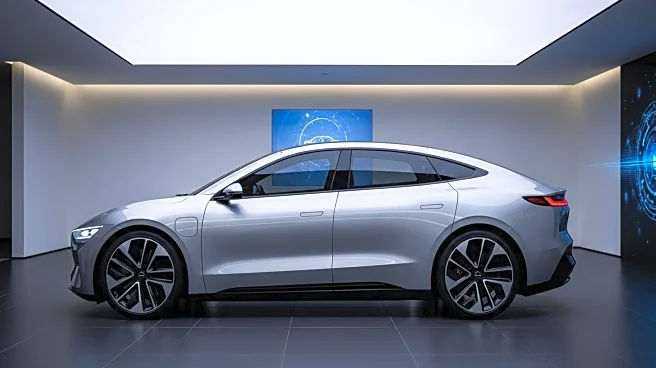What's Happening?
BMW of North America is gearing up for the official unveiling of the iX3 at the 2025 Munich Motor Show. The iX3 is set to introduce a new design language for BMW, featuring a smaller, illuminated kidney grille that marks a return to the brand's traditional styling. This mid-size electric SUV will be the first to utilize BMW's Neue Klasse platform, which is specifically designed for battery-electric vehicles. The iX3 promises around 400 miles of range in the U.S., with options for rear- and all-wheel-drive, as well as a more powerful M Sport model. Inside, the vehicle will debut a redesigned cabin with the first production use of the Panoramic iDrive dashboard, a futuristic interface arranged across two distinct levels.
Why It's Important?
The introduction of the iX3 represents a significant shift for BMW as it embraces electric vehicle technology and design innovation. The Neue Klasse platform is expected to underpin all future BMW EVs, highlighting the company's commitment to sustainability and efficiency. This move could strengthen BMW's position in the competitive electric vehicle market, appealing to environmentally conscious consumers and those seeking advanced automotive technology. The redesigned cabin and new dashboard interface may also set a new standard for in-car technology, influencing future vehicle designs across the industry.
What's Next?
The official unveiling of the iX3 at the Munich Motor Show will provide further details on its features and capabilities. BMW's focus on electric vehicles and innovative design may prompt reactions from competitors, potentially leading to advancements in EV technology and design across the automotive industry. Consumers and industry experts will be watching closely to see how the iX3 performs in terms of efficiency, range, and driving dynamics.
Beyond the Headlines
The shift towards smaller, illuminated grilles and advanced dashboard interfaces in the iX3 may influence broader design trends in the automotive industry. As BMW returns to its roots with a more minimal design, other manufacturers might follow suit, leading to a resurgence of classic styling elements in modern vehicles. Additionally, the emphasis on battery-electric platforms could accelerate the transition to electric vehicles globally, impacting environmental policies and consumer preferences.








